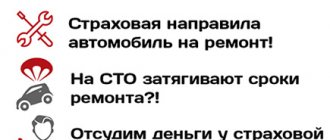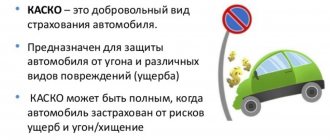Home / Complaints, courts, consumer rights / Services and consumer protection
Back
Published: 10/06/2018
Reading time: 6 min
0
658
Carrying out restoration repairs to a car after damage, if it is included in the insured events, is carried out under the CASCO insurance program.
- Procedure for a car owner in the event of an insured event
- What affects the duration of repair work?
- Maximum car repair time
- Repair times at official and unofficial dealers
- Procedure in case of violation of repair deadlines
In this case, the insurance company must adhere to the maximum deadlines for repair work established by law or contract. In case of violation, the insurer faces liability.
What the law says
If the Insurance Rules and the CASCO agreement do not specify the time for restoration work, the client can safely follow the following regulations:
- Civil Code of the Russian Federation
Article 314, paragraph 2 of the Civil Code states that if the deadline for repair work is not indicated anywhere, it must be completed within a reasonable time.
- Law on consumer protection
Establishes that the maximum period for completing work cannot exceed 45 days.
What does it depend on and who is responsible?
The timing of restoration repairs is regulated by the rules of operation of the insurance organization and is necessarily recorded in the insurance contract (Article 943 of the Civil Code of the Russian Federation).
Thus, according to the law, it is the insurance company with which the corresponding agreement has been concluded that is responsible for the timing of repairs under CASCO. The repair organization is obliged to strictly follow the established rules.
What factors does the parameter under consideration depend on, besides the current rules? Determination of deadlines is influenced by:
- the severity of the injuries received. To eliminate serious damage that requires a complete replacement of any components and assemblies, it takes more time than to carry out minor repairs. In addition, if the insured car was damaged by 75% or more, then the repair time may be delayed due to the insurance company, which will decide on the advisability of restoration work. In some situations, it is better to pay compensation for the “Total Loss” risk rather than restore the vehicle;
- individuality of damaged parts. Repair of a foreign car (especially high-end and luxury equipment) may take longer due to the lack of necessary parts in the organization, and delivery of units requires additional time;
- agreement between insurance and repair organizations. In most cases, companies work on the basis of an agreement, in which a separate clause stipulates the timing of repairs in the direction. If vehicles are sent to an organization with which there is no such agreement, then the deadlines may be delayed due to the fault of the repair organization;
- presence/absence of a queue for repairs. In large insurance companies with many obligations, the time frame for vehicle restoration may be delayed due to the large number of insured events. Quite often such situations arise, for example, after the first snow falls and ice forms.
Clarifications of the Supreme Court regarding the application of the provisions of insurance legislation
When preparing for the trial, it is necessary to take into account valuable information about the attitude of the judicial authorities towards disputes of interest to the car owner regarding CASCO with the insurance company:
- The reason for compensation is the established fact that the event is recognized as insured.
- If the car is damaged while being driven by a driver not specified in the contract with the insurance company, payment must be made, and this violation is not a basis for refusal of compensation.
- When the insured car is completely destroyed and the case is considered as insurable, instead of compensation for the restoration of the vehicle, the full amount of insurance coverage is paid.
- The company that provided insurance services is responsible for the proper quality of work performed by the car service center in order to restore the car in accordance with the issued direction.
- When determining the amount of insurance payment, it is necessary to consider the terms of the concluded agreement, based on the method of compensation chosen by the policyholder. The amount of damages is determined taking into account the degree of wear and tear of the machine or without it. If in an insurance situation there is a complete loss of the vehicle, without the possibility of restoration work, in accordance with clause 5 of Art. 10 Federal Law No. 4015-1 of 1992, compensation is determined by the amount of insurance coverage in full.
- The main legislative act on the regulation of the rights and claims of car owners who voluntarily insure personal property not used for generating income is the Law “On the Protection of Consumer Rights” without the application of special legislative norms.
Refusals declared illegal
If the insurance company refuses to pay compensation under the concluded CASCO agreement, the plaintiff can formulate its position on the basis of information about the established practice of recognizing a number of reasons as insufficient grounds for rejecting the insurer’s claims:
- a copy of the signed contract is lost or lost by the insurer or signed by an employee who does not have such competence;
- the cost of the policy has not been fully paid;
- the car owner did not submit a written application to the IC office or the application was made later than the deadlines established by the company;
- the car was driven by a driver who is not included in the insurance or does not have the right to drive the car;
- In response to a statement from the owner of the car, the police refused to initiate a case;
- there was no document in the car confirming a scheduled technical inspection;
- lack of a complete set of documents for the car (no title or registration certificate), lack of a complete set of keys;
- information about equipping the car with alarm systems on the car turned out to be unreliable;
- a resolution from the State Traffic Inspectorate confirming the completion of the administrative violation proceedings has not been provided;
- the involvement of specific citizens in the damage caused has not been clarified, there is no clear picture of the circumstances in which the car was damaged;
- refusal to pay for tow truck services;
- the nature of the damage to the car does not correspond to the mechanism of the collision;
- refusal to recognize water hammer as a situation allowing compensation under CASCO;
- rejection of demands to reimburse the cost of wheels if they are stolen from an insured vehicle;
- approval of the Investigative Committee to recognize the agreement as not having entered into force;
- The number by which the car was identified has changed.
Due to the prevalence of claims between the insurance company and the policyholder, it is not possible to fully list the controversial situations.
However, it should be remembered that in addition to the provisions of the contract concluded under CASCO, the plaintiff must rely on the general rules of civil law applicable to the circumstances under consideration.
When a referral is issued
The timing of issuing a referral for repair of a damaged vehicle is regulated by the insurance contract concluded with the companies.
In standard situations, to receive a referral for car repairs, you must:
- submit a written application to the auto insurer regarding the insured event;
- collect and submit to the company a set of documents that determine all the most important factors of the insured event;
- undergo an examination to determine damage.
The period established by the contract will be calculated from the moment of carrying out all the listed operations. On average, it takes a car insurer no more than 30 days to fulfill its obligations.
However, it should be noted that the calculation of this period will begin:
- from the moment of submitting documents, if the car is damaged as a result of any circumstances;
- from the moment of receiving a certificate of refusal/closure of a criminal case, if the vehicle was stolen.
The CASCO insurance contract may establish a list of insured events for which documents are not required, for example, repair of a windshield under CASCO. In this situation, the time frame for providing referrals for repairs may be reduced.
This is also important to know:
How to write a claim correctly: writing sample
Thus, in order to independently monitor compliance with the deadlines for repairs of the insured car, you must carefully read the concluded auto insurance contract.
What documents are needed
To receive a referral for repairs, you must provide a number of documents to the insurance company, which depends on the type of insured event.
In any situation you will need:
- a valid CASCO policy and a receipt for payment of the cost of the insurance policy;
- civil passport of the car owner;
- registration documents for the vehicle (PTS, STS);
- driver's license of the person driving the car at the time of the accident;
- diagnostic card confirming the serviceability of the insured vehicle.
If the damage is caused by a road accident, then additionally the following is provided:
- Certificate of participation in a road accident. The documents establish the fact of the accident, the parties involved and the damage received.
- Information about the incident. The document reflects data about the drivers and vehicles involved in the accident. The documents drawn up and the damage received are also indicated.
- Copies of the protocol and resolution on the administrative offense committed (provided if such documents were drawn up). These documents can be replaced by a notification of an accident (European protocol).
- Copies of documents confirming the refusal to initiate an administrative case (the document is provided if a protocol was not drawn up at the scene of the road accident).
If the damage to the car was caused by illegal actions of third parties (repair under CASCO without an accident), then the car insurer is provided with:
- Notification from the Department of Internal Affairs about the occurrence of an insurance situation.
- A certificate from the Department of Internal Affairs confirming the circumstances of the occurrence of the insured event and the presence of damage.
- Documents confirming the initiation or refusal to initiate a criminal case.
If the damage was received under other circumstances, then the following is provided:
- certificate from the Hydrometeorological Service (natural disaster);
- a certificate from the fire inspectorate and a fire report (fire);
- certificates from the relevant authorities (man-made accidents, pipeline accidents, etc.).
If the insurance contract provides for the possibility of repairs under CASCO without certificates, then in order to receive a referral for restoration repairs, only a standard set of documents is provided.
Required documents and recovery time frames
The documents submitted to the insurer to transfer the car to the service center are determined by the fact of the insurance event.
The policyholder collects a package of documents, which includes:
- Policy.
- Certificate confirming the registration of the car.
- Driver's license.
- Confirmation of passing technical inspection.
- Information about the participants in the road accident and damage to the vehicle.
- If available, a copy of the administrative protocol on the offense.
- Ruling on refusal to initiate administrative proceedings.
If the cause of the insured event was a natural disaster, then a document from the Hydrometeorological Center is submitted.
In case of fire, the policyholder presents a fire report with a certificate from the territorial unit of the Ministry of Emergency Situations. The period of vehicle repair work is calculated from the moment the documents are accepted by the insurance company. If the insurance conditions do not provide for this, then the citizen has the right to submit an application demanding to indicate the start and end date of the repair.
The company is the insurer in this case:
- responds in writing to the policyholder about the terms agreed with the repair organization;
- directs the applicant to a car service center to obtain an answer;
- denies this information.
If the current situation does not suit a citizen who has the legal right to be informed about the period of repair work, then one should turn to the provisions of the law on the protection of consumer rights. The court recognizes the policyholder as right and obliges the insurer to inform interested parties about the deadlines.
Repair period according to comprehensive insurance
Since comprehensive insurance is voluntary insurance, the repair period under comprehensive insurance is not defined by law. The provisions of the Civil Code of the Russian Federation and the Law on Insurance indicate that the conditions for compensation for damage, including the timing of repairs under comprehensive insurance, must be determined by the insurance contract or insurance rules. There is a Regulation on the maintenance and repair of vehicles, approved in 1992 by Order of the Ministry of Industry. The data in this document can be used by car owners who have received a referral for repair work at the insurer’s service station, unless other terms are specified in the comprehensive insurance contract.
Maximum term
The regulations of the Ministry of Industry provide comments on the timing of repair work for domestically produced vehicles, indicating the maximum allowable time for restoration, which depends on the type of damage. Thus, engine repair should not exceed 2 days, body paint, taking into account the removal of old paintwork - no more than 15 days, actions related to tinsmithing and welding work - no more than 20 days. The longest period - 50 days - is given for complex tinsmithing and welding work with complete painting of the car.
Article 20 of the Consumer Rights Law states that the maximum period for troubleshooting should not exceed 45 days. If an additional agreement was concluded between the parties to the contract regarding the timing of car repair work, but the process is delayed due to the lack of necessary parts or other reasons, then this cannot serve as a basis for revising the originally established deadline and releasing the company from liability to its client .
From an official dealer
Repairs under comprehensive insurance from an official dealer usually do not exceed 30 days and, depending on the complexity of the damage received in an accident or other situation, can be reduced to 1-14 days. The client has the right to receive reports from the car service about the progress of work and the time spent on restoring certain parts.
This is also important to know:
Is it possible to return alcohol to the store: what the law says
If, after completing all restoration work, the car owner finds unrepaired defects, the service station, in accordance with paragraph 2 of Article 314 of the Civil Code of the Russian Federation, is obliged to eliminate them within the next 7 days.
Free legal consultation
We will answer your question in 5 minutes!
Free legal consultation We will answer your question in 5 minutes!
Ask a Question
Ask a Question
From an unofficial dealer
Under the terms of some insurance contracts, repairs under comprehensive insurance may be carried out by unofficial dealers. Sometimes an organization issues a referral to an unofficial dealer, circumventing the terms of the contract. This decision may be motivated by the fact that the official dealer uses only original spare parts for repair work; sometimes they are not available and you have to waste time waiting for their delivery.
For the most part, informal situations do not arise. During their work, they can also use non-original parts, which will be economically beneficial for the insurer, because the cost of such parts is lower. Often in such situations, work is delayed, since such service stations do not have the proper technical equipment and highly qualified specialists. Despite this, the period cannot be longer than 45 days established by the consumer rights law.
If it's your fault
If the comprehensive insurance policy and insurance rules provide for the risk of damage to the car due to the fault of the car owner and repair work of damaged property in a car service can be used as compensation, then the work is carried out within the same time frame - no more than 45 days. If an accident due to the fault of the car owner is not an insured event under the contract, then he will be denied insurance payment and a referral to a service station, because the insurer will have no reason to fulfill his obligations.
Circumstances affecting timing
The deadline for repairs under CASCO insurance is specified in the contract. If the policyholder has superficially studied the provisions defining the rules and duration of restoration work of the car upon the occurrence of an insured event, set out in the insurance document, and has not noticed the absence of the specified period, then the duration will be a significant period of time.
To avoid troubles associated with increasing deadlines, some rules are followed:
- In the event of an insured event, collect documents for registration and personally present to the insurer.
- Hand over the car to the car service center with the preparation of the corresponding acceptance certificates.
- Periodically inquire about the stages of repair.
The personal interest of the vehicle owner in high-quality repairs of the car under CASCO within the time limits specified in the contract will avoid litigation.
In addition, it is necessary to follow the following recommendations when familiarizing yourself with the proposed agreement:
- study in detail the section providing for sending the vehicle to a service center;
- if there is no repair period in the contract, it is necessary to draw the attention of the insurance organization to this and request changes to the text;
- At a minimum, a time limit should be required.
The legal basis for specifying the timing of car repairs under CASCO is, according to the law, civil and consumer protection legislation.
Repair work through an insurer includes an agreement with a car service. In this situation, the policyholder finds himself without a legal relationship with the repair organization. Having in hand a CASCO repair agreement with repair terms, the citizen guarantees the fulfillment of obligations to restore the car.
The Civil Code of the Russian Federation defines the concept of a reasonable period for the fulfillment of any obligations when this period is not defined. The Plenum of the Supreme Court of the Russian Federation, in its resolution reviewing judicial practice, provides a link to the regulatory document of the Ministry of Industry. This is order No. 43 of the Department of Automotive Industry of the Ministry of Industry dated November 1, 1992, which gives a clear understanding of the maximum repair periods.
This regulatory document establishes:
- Two-day period for engine overhaul.
- A ten-day period for painting the exterior of the body, leaving the old paint.
- A fifteen-day period for painting the exterior of the body, removing old paint and painting the entire body.
- A twenty-day period for painting the entire body with removal of old paint and tin and welding work.
- Thirty days for difficult sheet metal and welding work.
- Thirty-five day period for sheet metal and welding work with further painting.
- Fifty-day period for difficult sheet metal and welding work with further painting.
Work on each type of repair is coordinated with a representative of the car service center and controlled by the insured. A specific date for completion of repairs, if not available, is included in the additional agreement if the insurer for some reason refuses to change the text of the contract.
The insurer is legally responsible for the repair period under CASCO insurance. Performance obligations are determined by bilateral agreement.
The length of the repair period in practice depends on the following factors:
- the degree of damage to the vehicle as a whole;
- the nature of the damage caused to individual parts;
- terms of the agreement for work between the insurer and the official dealer who has undertaken to repair vehicles after an accident;
- the presence or absence of a large number of cars in the service center that need to be repaired due to an insured event.
Serious damage, unlike minor damage, requires significant time spent on repairs.
If the damage is at least 75 percent, then the insurer will increase the time to compare the costs of restoration and payment of compensation. Damaged parts of imported cars are usually ordered from official representatives. Delivery of the required unit provides for an increase in repair time.
The presence of a negotiated agreement between the insurer and the car service, which specifies the terms of repair work for each type of damage, will reduce the recovery time. Otherwise, a time delay is inevitable.
The workload of the service, bound by contractual obligations with insurance companies popular among car owners, during a period of increasing insurance events and, accordingly, a large number of cars, will increase the duration of repairs.
Where to make repairs
If it is not intended to pay compensation in money, but a referral for repairs is issued, then, as a rule, it is carried out at a station with which the insurance company has an agreement. At the same time, the policyholder in the application for compensation for the loss can indicate the institution where he intends to carry out restoration. Also, this point is stipulated at the stage of concluding the contract, which the car owner must provide for, and the representative of the insurance company must clarify. There is also the option of restoration at a service center that services the car under warranty.
By franchise
When using a franchise in a contract, the driver must understand that he will have to pay some amount himself. If the other driver is at fault in the accident, you can receive compensation under the deductible from his company. Payment under CASCO and OSAGO from different companies for the same case is illegal.
Warranty car
A car that is under warranty, which is a new car, in accordance with the Resolution of the Presidium of the Supreme Court on the review of cases related to voluntary insurance, must be repaired by an official dealer.
The reason for this is the fact that if this requirement is not met, the warranty will be canceled and during subsequent repairs the owner will be forced to restore the car at his own expense. Important! If there is no service station within reach, the victim can demand compensation to restore the car at a price corresponding to the cost of the work at the dealer.
Order and nuances
In order to receive a referral to repair a damaged car in a timely manner, and not receive a refusal of insurance payment, you must:
- notify the car insurer of the occurrence of an insured event as soon as possible. Additionally, it is recommended to clarify the list of documents required for registration;
- do not miss deadlines for submitting applications and documents to the insurance company. Missing deadlines is often the reason for refusal to pay insurance compensation. The period allotted for submitting documents is also regulated by the CASCO car insurance contract;
- provide vehicles for the examination. Without the result of the inspection, it is not possible to receive a referral for repairs;
- if the insurance contract provides for a deductible, then compare the cost of repairs and the amount of the established non-payable amount.
- Repairs under CASCO franchise are paid only if a large sum of money is required to restore the vehicle;
- provide vehicles for repairs to the appropriate organization.
This is also important to know:
How to draw up an act of returning goods: procedure and rules for registration
Within 2 weeks, service stations are required to determine the cost of repairs and agree on the list of work with the insurance company. The policyholder must be notified of the commencement of work.
After the restoration of the vehicle is completed, an act is drawn up that regulates the transfer of the repaired vehicle to the owner.
If the repair is carried out efficiently and the car owner has no complaints about the car service, then the report is signed by both parties. Otherwise, you do not need to sign the document.
A claim regarding the quality of repairs is sent to the insurance organization, which is obliged to eliminate all identified deficiencies. If the auto insurer refuses, you can defend your rights in court.
The nuances of opening a comprehensive insurance policy
Work begins with collecting papers. After this, they contact the insurance company with a corresponding application.
List of required documents
To apply for a policy you will need:
- passport of the car owner;
- STS and PTS;
- driver's licenses of persons included in the policy;
- loan agreement (when purchasing a vehicle using borrowed money);
- previously purchased policy (upon renewal);
- documents for additional equipment.
To issue a policy, you need the owner's passport.
Stages of the registration process
To obtain a policy online, perform the following steps:
- Register in your AlfaStrakhovanie Personal Account. To do this, indicate your phone number and email. Confirm the action by entering the code received via SMS.
- After authorization, they begin filling out the form. Indicate all the information required by the program.
- Pay for the policy with a bank card. The account details are entered in the lines. Press the “Pay” button. A receipt confirming the fact of depositing money is sent by email.
The client can obtain a paper version by contacting the insurance company office. Here they issue a contract and policy certified by the manager’s signature on letterhead.
The paperwork is completed by inspecting the vehicle and receiving the relevant certificate.
Violation of deadlines and penalties
If repair work is delayed and the insurance company does not explain the reasons for the delay, then the policyholder has the right:
- pick up and repair a car at another organization;
- file a claim in court for reimbursement of expenses incurred for repairs.
With the amount spent on repairs, the owner of the car has the right to recover a penalty from the insurance company for delaying the fulfillment of obligations.
The amount of penalties, as a rule, is established by the insurance contract based on a certain percentage for each delay in delay.
However, before implementing the described scheme, it is necessary to follow the pre-trial procedure for resolving the dispute. The pre-trial procedure involves filing a written complaint with the head of the insurance company.
The document must indicate all aspects of the current situation. All documents about the occurrence of the insured event and the actions taken are also attached to the claim.
Most disagreements with insurance organizations are resolved during pre-trial proceedings.
Delivery time for spare parts
The most significant reason for repair delays is the lack of replacement parts.
On average, spare parts are delivered:
| Within 7 – 14 days | if the required units are ordered from companies located in the Russian Federation |
| Within 15 – 30 days | if the necessary spare parts are delivered from another country |
However, delivery situations may vary. For example, this unit is out of stock and an additional order of the item is required from the official manufacturer of the vehicle, or problems have arisen with the transport company from which delivery was ordered.
If a delay in repair work occurs due to the lack of spare units, the repair organization is obliged to notify the insurance company and the policyholder in writing of the reason.
The policyholder, by prior agreement with the auto insurer, has the right:
- replace the repair company;
- replace the method of receiving compensation with monetary compensation.
So, the deadlines for repairing motor vehicles under CASCO are regulated by law (maximum period) and the rules of work of the auto insurer.
To avoid delays in repairs, the policyholder must clearly state the deadlines for completing the work in the insurance contract and independently control the repair process.
Time limits for vehicle restoration
In practice, common cases of carrying out repair work under CASCO are:
- From an official dealer.
- From an unofficial dealer.
- If the insured is found guilty of damage to the vehicle.
Vehicles whose warranty has not expired are sent to the official partner. The recovery period is 15–30 days. Any car can be sent to the car service, which is an unofficial partner of the company. Including those under warranty, if this is stipulated in the contract. The recovery period is up to 5 days.
Damage to a vehicle driven by the policyholder occurs frequently in life. In this situation, the CASCO policy will provide repairs at the expense of the insurance company under the conditions specified in the contract.
Additional questions
What to do if the recovery period is really prolonged
If the insurer is in no hurry to respond to the submitted application, the person submitting it can safely write a complaint, guided by the above regulations.
The first stage of conflict resolution may be pre-trial proceedings. The policyholder contacts the insurance organization with a written complaint. It must indicate when the application was submitted. Relevant documents must be attached to it.
As a rule, the insurer resolves the issue and pays the victim a penalty specified in advance in the CASCO policy. If the company refuses to resolve the conflict, the policyholder must pick up the vehicle and file a lawsuit against the insurer or repair organization.
Article 430 of the Civil Code of the Russian Federation states that liability under an agreement concluded in favor of third parties accrues to both the creditor and the debtor. That is, if a service station believes that it does not bear any responsibility to the policyholder, then this is not true. The policyholder has the right to control the elimination of breakdowns and find out the reasons for the delay in repairs.
As compensation, according to a court decision, the policyholder is entitled to:
- payment for repair services (if the policyholder carried out repairs at his own expense);
- payment of penalties;
- in some cases - moral compensation.
How to protect yourself from possible problems with deadlines
Some conflicts with lengthy car repairs can be avoided if:
- immediately after the occurrence of an insured event, write a statement about this to the insurance company. This will help avoid claims. The deadline for filing is established by the Insurance Rules (maximum period - 3-5 days);
- try to indicate exact deadlines in order to be able to refer to them (if they are not specified in the Insurance Rules);
- Constantly monitor the situation, and in case of violations, contact the Investigative Committee or Service Station.
How to accept a car after repair
In order for the car to be accepted correctly, you should take care in advance about its correct delivery. To do this, the car owner must be present when the car is put into operation. The vehicle inspection must also be carried out in his presence and in good lighting conditions. Attention should also be paid to small scratches and dents.
This is also important to know:
How to return a technically complex product
A document that is confirmation of successfully completed work or fulfillment of obligations on the part of the insurance company is called an acceptance certificate. Its signing by the owner of the car means that there are no claims and that the work was done efficiently. Acceptance is made within 1 – 3 days.
The act itself should contain the following information:
- List of damages ordered to be repaired by the Investigative Committee
- List of parts that needed to be replaced
- Defects that were not part of the service station’s task to eliminate
- Hidden defects
- Description of the complete set
- Notes with comments from the car owner or wishes for services performed
The owner receives other documents:
- act on actually performed actions
- original work order
- a receipt confirming payment for work by the owner of the vehicle
- payment slip from SK
- invoices confirming payment for workshop parts
- warranty from auto repair shop
It is important to understand that you should sign any papers only after you have the desired result for the services provided. If work is identified that was done without the consent of the owner, he has the right to file a complaint with the service station and demand compensation. You can also go to court with it.
Poor quality repairs - what to do
Poor quality of repairs or incomplete implementation reduces the value of a car that has already suffered damage. This often happens during straightening, painting, or installation of new structural parts.
In such a situation, you can do the following:
- contact the workshop with a request to redo the work
- in case of refusal, contact the Investigative Committee
- go to court, RSA, Central Bank, Society for the Protection of Consumer Rights
Important
Requests, claims, and complaints are made in writing and sent in person or by registered mail. You must leave one option to confirm your request. It is signed by a representative of the organization. Going to court is relevant if low-quality parts were used, and as a result the car slows down, moves poorly, has scratches on the body, or poorly done work on the interior.
How to get money instead of repairs
Determining which is better: money or repairs is easier in case of an insured event and depending on the characteristics of the damage received. If the damage is insignificant, then it is better to choose money. To receive them, your requirements must be indicated in the application for compensation. According to the terms of some agreements, payment of money may not be provided. In this case, you can write about your claim, but whether it is approved or not will depend on the decision of the insurer.
Free legal consultation
We will answer your question in 5 minutes!
Free legal consultation We will answer your question in 5 minutes!
Call: 8 800 511-39-66
Ask a Question
Some companies offer more favorable offers on policies, providing the opportunity to have repairs done at a service station with which they have an agreement. The ideal solution would be to provide an alternative where the client has a choice in determining the choice between repairs and money for them.
There is a document on this issue - Resolution of the Plenum of the Supreme Court of the Russian Federation No. 20 dated June 27, 2013. according to which the victim, under such circumstances, can entrust the repair of the car to other people (third parties) or to do it himself, and then claim the required amount within the limits of insurance coverage for the restoration of the car.
Repair will be advisable in the following situations:
- The car is under warranty and will be restored in the center from an official dealer.
- The contract states payment of money taking into account wear and tear.
This is also important to know:
How to get a refund for a hotel if you check out early
Money is preferable in the following cases:
- The car is running, the damage is not significant.
- There are misunderstandings, conflicts, unpaid bills between the insurance company and the service station, and there is no agreement on the list of necessary works.
Thus, the repair of a vehicle under CASCO depends on the specifics of the case and the Rules, the organization of the activities of a particular insurance company. The owner should learn about how payment or restoration of the car can be made at the stage of drawing up the contract. The reason is possible situations that do not imply the presence of choice. When trusting an insurance company, one should not forget about vigilance, since how quickly, correctly, and efficiently the insurer’s obligations will be fulfilled depends on the condition and market value of the vehicle.
What to do if refused
If a refusal is received, such a decision must be handed over in writing. The next step is to contact an expert organization. She must be certified. Based on the refusal and expert opinion, you can go to court. He can help you get compensation or payment for repairs, money for a lawyer, or moral damages.
Why can they refuse?
There may be a refusal to apply for restoration. The most common reasons for this are the following:
- The insurer did not transfer money for repairs or did not transfer the entire amount.
- The service station received a vehicle that did not comply with its documentation.
- The CASCO agreement is expired.
- There are no necessary spare parts or technicians.
- The scope of work has not been agreed upon between the service station and the insurer.
- Intentional actions of the owner in relation to damage to the car.
- The driver is not included in the policy.
- The insured event corresponds to the list of exceptions according to the Rules of the Insurance Company (the driver was not sober, the car was faulty, which led to an accident).
If they require additional payment
A very common situation is when, upon arriving at a car service center, you are told that the insurance money transferred is not enough to completely restore the car, and they ask:
- or pay extra from your own pocket,
- either they will supply you with used spare parts or leave some elements unrepaired.
This is illegal in 2021! According to the MTPL law, the insurance company is obliged to fully compensate for the damage without any additional payments. Unlike payment in money, when damage is calculated taking into account the wear and tear of the car, when issuing a referral for repairs, wear and tear is not taken into account.
The lack of transferred money is not your problem. But it’s not a car service problem either. This is the insurance company's problem. In this case, provide the car to the service station under video recording, record the refusal to accept the car, specifying the grounds for refusal. Next, contact your insurance company and notify them about this.
When you tried to provide the car, you formally began a period of 30 days for repairs. Because the Federal Law on Compulsory Motor Liability Insurance clearly states the beginning of this period:
... the period for carrying out restorative repairs of the damaged vehicle (but not more than 30 working days from the date the victim presented such a vehicle to a service station or transferred such a vehicle to the insurer to organize its transportation to the place of restorative repairs);
If you are asked to sign an additional agreement
You don't need to sign anything. An additional agreement will most likely imply unfavorable conditions for you - the same replacement of new parts with used ones, additional payments, etc.
Remember that the legislation of 2021 does not require any documents from you when handing over your car to a service station under compulsory motor liability insurance.
How to get a referral for repairs
If the CASCO policy stipulates compensation for possible damage by the insurer in the form of restoration repairs, you need to receive from him the corresponding document - a referral for repair work at the expense of the insurance company. You can quickly resolve this issue if you strictly adhere to the algorithm for recording an insured event established by the insurer.
If you discover damage to your car (accident, natural disaster, theft, destruction of the car, etc.), you need to:
- immediately call the insurance company by phone and call an expert;
- it is advisable to record the fact of the accident and the serious damage to the car (photos, videos, witness statements);
- call the police (police report + certificate describing the injuries received);
- wait for the arrival of an insurance company employee, who must inspect the car and record the damage incurred.
Important! If you are involved in an accident, it is advisable for you to call traffic police inspectors; if the car is stolen, damaged by third parties or a fallen tree - police officers. If you need to call a car tow truck, be sure to keep receipts for payment of services in order to present them to the insurer. Do not take any action to repair the car until a final decision has been made by the insurance company!
After receiving a repair order, you will have to deliver the car to a service station for a technical inspection, assess the damage incurred and draw up an estimate for the cost of restoration repairs. The service station workers themselves will send the documents to the insurer to agree on monetary compensation for the work.
Next, you should submit a package of mandatory documents to the insurer for approval. The law does not specify strict deadlines for reviewing documents, but the procedure usually takes up to 7 days. If the insurer's employees confirm the occurrence of an insured event and damage resulting from it, they will issue you with a referral for repairs to a service station at the expense of the insurance compensation (in paper or electronic form). Such a document has no time restrictions - it is valid at any time, and you choose the time of contacting the car service.
Documents for the insurer
The following documents must be submitted to the insurance company:
- passport + driver's license of the car owner;
- STS and PTS of the car;
- CASCO insurance policy;
- claim for damages;
- certificates from the traffic police confirming the fact of an accident (during a car accident) or theft (from the police department);
- certificate of vehicle inspection at a service station (if available).
Depending on the type and characteristics of the insured event, you may be required to submit other documents (acts from the Ministry of Emergency Situations about the fire, medical examination, etc.). The more documentary evidence you have, the less time you will need to agree with the insurer.
After agreeing on material issues and choosing a car service to carry out repairs, we recommend that you enter into a written agreement with the service station management for the provision of repair services, which will clearly indicate the volume and list of work, the timing of their completion (most often 2-3 weeks), the cost of spare parts and repair. Your insurance company pays for the work according to the CASCO agreement.
If there was no accident (no certificate of accident)
If the damage to the car was not caused by an accident (natural disaster, damage by third parties, collision with animals or foreign objects), then you do not need a certificate from the traffic police, but you will need a certificate from the police department with a list of recorded damage.
If the car is damaged due to the fault of the owner
If you are the culprit of an accident or other insured event, you can count on compensation for damage from the insurance company under CASCO (here property is insured, not liability). Unless the terms of the contract provide for other rules, you will need to provide the insurer with the required documents.
Remember that traffic police do not register minor damage (violation of paintwork, broken glass parts, headlights, mirrors) of the car. Be sure to make sure that this fact is taken into account in the insurance contract, otherwise you will restore these parts at your own expense.









